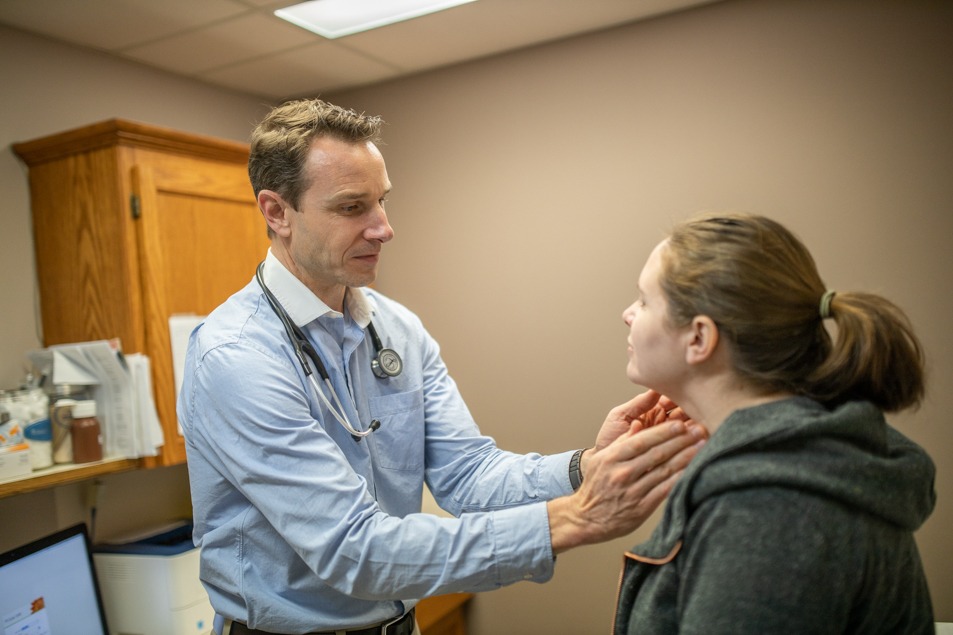
Doctors mentoring doctors to create a healthier community
West Niagara is not immune to the ongoing opioid crisis affecting communities across North America.
An innovative model of care at West Lincoln Memorial Hospital (WLMH) hopes to expand the treatment options available for this major health issue.
One of the hospital’s biggest strengths is its primary care model, which facilitates an environment for doctors at the site to learn from each other. The aim is to provide more treatment options to at-risk patients.
Dr. Mat Noble-Wohlgemut helps lead this initiative under a new mentorship model at the site.
“We came up with this model so we can collectively find treatment solutions for patients who are at risk,” says Dr. Noble-Wohlgemut, interim site medical director at WLMH. “Doctors talk about the challenges they encounter when patients present with certain symptoms in the emergency department.
“When we saw there was a gap with what we’re seeing and what we could prescribe, we took action to fix that.”
“We came up with this model so we can collectively find treatment solutions for patients who are at risk.”
The program will start in the emergency department at WLMH and may spread to the local family practice teams over time.
Teach a person to fish
How does a mentorship model work, exactly?
Doctors at WLMH developed a grassroots solution to teach each other how to care for patients presenting challenging illnesses, both in the emergency department and in their offices.
Still in its early stages, the ultimate vision is a model that includes education for the primary care provider and access to support from a specialist.
Mental health team support
Dr. Roselyn Wilson arrived at WLMH in November. She is a psychiatrist with the mental health team and has a special interest in concurrent disorders—people who experience both mental illness and a substance abuse disorder.
When she heard about the problem doctors were trying to solve, she offered to help.
“Part of our aim is to increase community capacity for treating addiction,” says Dr. Wilson. “We support doctors and staff by getting at-risk patients connected either with our team or other support in the community.”
Dr. Wilson and her colleague Sharlene MacLennan, a registered social worker, regularly engage with doctors at the hospital and in the community about people with high addiction and mental health needs.
“Part of our aim is to increase community capacity for treating addiction.”
They meet with WLMH doctors to support them in providing the most appropriate treatment to emergency patients with addiction-related concerns while they’re in the hospital.
“In these early days, I will consult with Dr. Wilson on the best way to care for at-risk patients,” says Dr. Noble-Wohlgemut. “As I develop my skill set in this area, I can then pass that onto my colleagues and so on and so forth.”
He is confident the hospital’s emergency department will build the foundation for community doctors to provide care within their offices. This will better address the needs of those who are at risk as a result.
Population health in West Niagara
Patients at the highest risk sometimes have difficulty accessing certain services. Though doctors at WLMH can refer people to specialists with ease, the challenge for some could simply be just getting to their appointment.
Having care closer to home will further support patients to start—and continue—treatment.
“Though we’re a smaller community, we’re no less at-risk than larger populations that suffer from the opioid crisis,” says Cindy MacDonald, Director, Community Programs at WLMH.
Dr. Noble-Wohlgemut says the mentorship model will create a healthier West Niagara.
“The community recognized and defined the issue, and now the community is co-creating the program that is going to meet the needs identified.
“Patients will ultimately have increased access to treatment options.”
This story was selected as a winner in our Strategy in Action contest, which asks teams across Hamilton Health Sciences to share how they are putting our strategy into practice.
This initiative supports Population Health, one of four strategic directions identified in Hamilton Health Sciences’ Strategic Plan. Population Health is about creating a healthier community. It takes into account the factors that determine a person’s well-being and guides our work with health and social service providers to support people who are most at risk of disease or preventable hospital stays.
